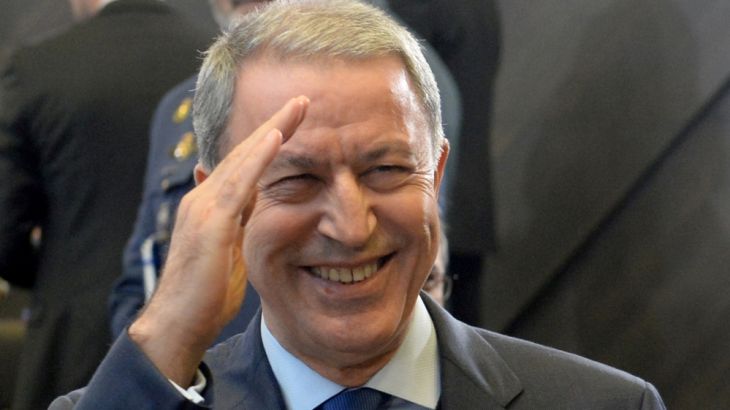
‘Not an invasion’: Turkey’s Hulusi Akar on Syria operation
Defence minister discusses military operation in Syria, cooperation with Russia and Iran, and ties with the US and NATO.
In October 2019, Turkey launched a military operation in northeast Syria to drive the Kurdish-led Syrian Democratic Forces (SDF) back from its border.
Dubbed Operation Peace Spring, Turkey’s push was also aimed at establishing a “safe zone” stretching at least 30km (19 miles) into Syria to resettle some of the 3.6 million refugees it currently hosts.
Keep reading
list of 4 itemsTurkish opposition wins major cities in local elections
What shapes Turkey’s municipal elections?
Turkey offers to host Russia-Ukraine peace talks as Erdogan hosts Zelenskyy
In an interview with Al Jazeera, Turkish Minister of Defence Hulusi Akar discusses the operation in northeast Syria, Turkey’s cooperation with Russia and Iran and Ankara’s strained relations with the United States and NATO following the purchase of the S-400 air defence system from Moscow.
The military operation in northeast Syria was condemned by the US, a NATO ally, and members of the international community, but for Ankara it was seen as necessary to ensure national security. The SDF is dominated by the People’s Protection Units (YPG), labelled “terrorists” by Ankara because of its ties to the outlawed Kurdistan Workers’ Party (PKK), which has been fighting the Turkish state for decades.
“Our only wish, our only goal, our only effort is towards the security of our country. Who from? The YPG, the PKK, terrorists and Daesh (ISIL, or ISIS). Our goal is to establish the security of our borders and our people,” Akar tells Al Jazeera.
“This is not an invasion in any way. This is not an attack in any way. It is only an operation launched against terrorists and terrorism.”
Akar says if a peace corridor is established, it may enable people to voluntarily and safely return to their homes.
“Yes, our president has been reiterating this issue for two or three years now,” Akar says, referring to Recep Tayyip Erdogan. “He has been making calls on the US and Europe and he articulated many times that the creation of a safe zone is very important, vital for Syrians and that is the most reasonable, rational and humane way.”
Akar says that with the repatriation of Syrians, “it will be possible for them to start a new life, and this, in return, will significantly contribute to peace, stability and the normalisation of all conditions, I believe.”
Responding to criticism that civilians were targeted during the military push, Turkey’s third in northern Syria, Akar says: “These claims about our operations targeting the civilians are against all facts. This is an unbelievable issue, because it’s not the first time we conduct operations, not the first time we fight against terror.”
He adds: “What we are doing here … is not arbitrary. We are not acting disrespectfully to any other party’s territorial integrity. This is an activity we have been undertaking for the security of our country and to make sure peace is built for the whole region.”
Asked whether Turkey is still determined to activate the S-400 air defence system, the purchase of which has created a diplomatic crisis with the US and NATO, Akar says Ankara’s position has been “very clear” from the onset.
“Our president has shared the attitudes, actions and plans by the Republic of Turkey or what we have done or will do, with the rest of the world.”
“By the end of 1990s, we have started to scrutinise on-air missile systems to enable the air and missile defence of our county and nation, and have exerted efforts to have them procured and supplied. Yet due to various reasons, we have had a delay on these activities. In particular, when the Syrian crisis emerged in 2011, it became a must for us to own air defence missile systems. Following that, we continued with our efforts intensively. However, the talks we held with the US and in Europe and the activities for procurement unfortunately couldn’t help make it happen.”
Akar adds: “Upon experiencing these all, it became apparently more clear that we were in need of a permanent air missile defence system. For this reason, we accelerated our supply-related activities and identified certain criteria. Within the framework of this criteria, we made contacts with Europe, the US and with Russia. The right response for these criteria came from the Russians. Therefore, that is how this started. It was a necessity.”
He says that the S-400 air defence system will be a “standalone system” that will not be integrated with other NATO systems.